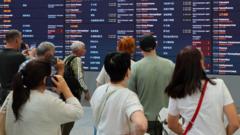As tensions soar in the ongoing conflict between Russia and Ukraine, significant disruptions hit major airports in the Moscow region following a wave of Ukrainian drone attacks. Russian officials reported the temporary closure of airports in Moscow, with at least 140 flights canceled due to the incursions. The drone onslaught, which led to the downing of over 230 Ukrainian drones, included 27 intercepted over the capital, according to the Russian defense ministry.
Russia’s aviation watchdog confirmed that operational interruptions affected the city’s four primary airports, causing over 130 flights to be redirected, although normal operations have since resumed. Alarm sprang again as Russian airstrikes in Ukraine reportedly claimed three lives overnight, underscoring the ongoing violence that continues to disrupt both nations.
In the past 24 hours alone, Moscow airports experienced ten closures due to drone strikes. The Kaluga region, located southwest of the capital, was also impacted, with Kaluga International Airport briefly closed after the interception of 45 drones on Saturday morning. Reports indicate these UAV incursions stretched beyond Moscow, with similar defenses activated in border regions such as Rostov and Bryansk, and over the Black Sea.
Ukrainian officials reported casualties, including two deaths from Russian commandeered air assaults on Donetsk and a fatality caused by residential fires in Sumy. In a show of resistance, Ukraine's air force claimed to have intercepted 18 of 57 Russian drones in one night. The front-line regions of Kharkiv and Zaporizhzhia saw renewed conflict as attacks persisted.
Amidst these military exchanges, Kremlin spokesman Dmitry Peskov remarked that President Vladimir Putin is still aiming to pursue a peaceful resolution to the situation, though he also affirmed Russia’s military objectives. His comments followed Ukrainian President Volodymyr Zelensky’s proposal for new negotiations to revive discussions that had stalled the previous month. Enhanced by recent support from the U.S., Zelensky signaled his willingness to meet Putin directly—a potential diplomatic breakthrough.
This dropping of rhetoric comes at a time when diplomacy remains fraught, as highlighted by former U.S. President Donald Trump's call for advanced military aid to Ukraine. Trump’s pledge marks a notable shift, applying pressure on Russia with threats of severe tariffs if a conflict resolution isn't reached soon. In response, Peskov characterized Trump's statements as part of a longstanding pattern, reiterating the Kremlin's commitment to pursue peace while remaining steadfast in support of their strategic aims.
The on-going military conflict continues to take a toll on both nations, with further fighting anticipated as each side maneuvers to achieve its objectives, leaving the door open for renewed peace talks and dialogue.
Russia’s aviation watchdog confirmed that operational interruptions affected the city’s four primary airports, causing over 130 flights to be redirected, although normal operations have since resumed. Alarm sprang again as Russian airstrikes in Ukraine reportedly claimed three lives overnight, underscoring the ongoing violence that continues to disrupt both nations.
In the past 24 hours alone, Moscow airports experienced ten closures due to drone strikes. The Kaluga region, located southwest of the capital, was also impacted, with Kaluga International Airport briefly closed after the interception of 45 drones on Saturday morning. Reports indicate these UAV incursions stretched beyond Moscow, with similar defenses activated in border regions such as Rostov and Bryansk, and over the Black Sea.
Ukrainian officials reported casualties, including two deaths from Russian commandeered air assaults on Donetsk and a fatality caused by residential fires in Sumy. In a show of resistance, Ukraine's air force claimed to have intercepted 18 of 57 Russian drones in one night. The front-line regions of Kharkiv and Zaporizhzhia saw renewed conflict as attacks persisted.
Amidst these military exchanges, Kremlin spokesman Dmitry Peskov remarked that President Vladimir Putin is still aiming to pursue a peaceful resolution to the situation, though he also affirmed Russia’s military objectives. His comments followed Ukrainian President Volodymyr Zelensky’s proposal for new negotiations to revive discussions that had stalled the previous month. Enhanced by recent support from the U.S., Zelensky signaled his willingness to meet Putin directly—a potential diplomatic breakthrough.
This dropping of rhetoric comes at a time when diplomacy remains fraught, as highlighted by former U.S. President Donald Trump's call for advanced military aid to Ukraine. Trump’s pledge marks a notable shift, applying pressure on Russia with threats of severe tariffs if a conflict resolution isn't reached soon. In response, Peskov characterized Trump's statements as part of a longstanding pattern, reiterating the Kremlin's commitment to pursue peace while remaining steadfast in support of their strategic aims.
The on-going military conflict continues to take a toll on both nations, with further fighting anticipated as each side maneuvers to achieve its objectives, leaving the door open for renewed peace talks and dialogue.

















